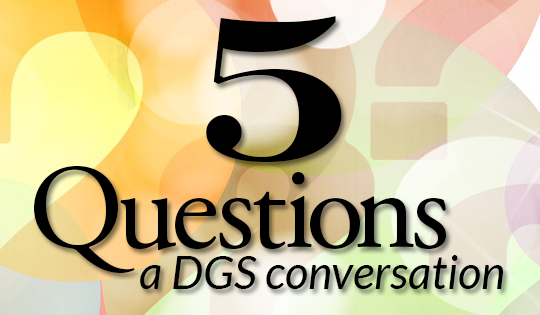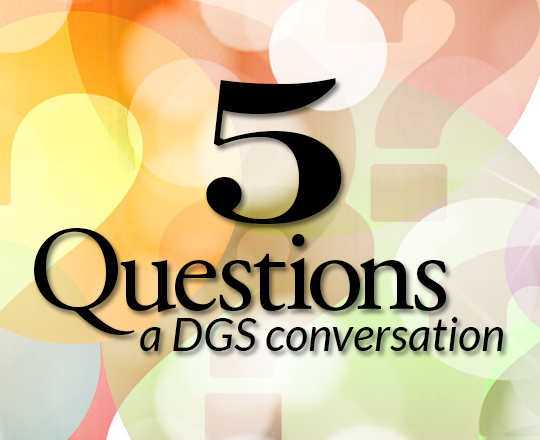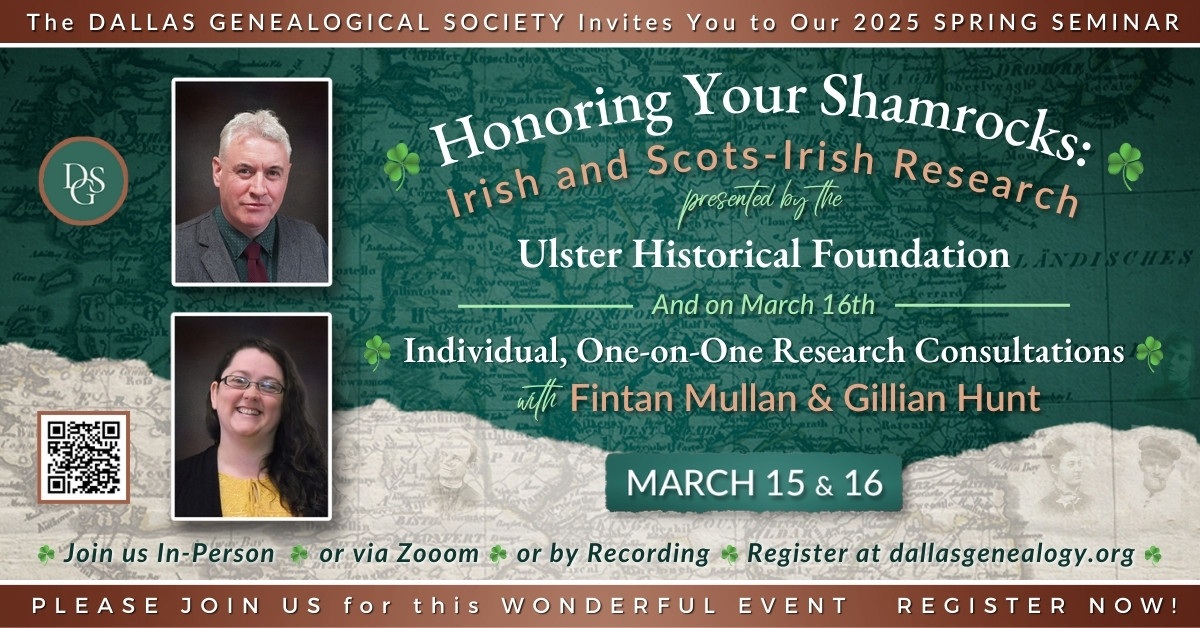Five Questions: Going Pro


Over the years, a number of the Dallas Genealogical Society’s members have undertaken genealogy as a profession. We wondered how some of our current pro members made the jump from hobbyist to professional.
The participants
- Susan Rainwater is the current DGS Director of Finance and member of the Website and Newsletter subcommittees. She is a 30+ year genealogical hobbyist with no plans to go pro.
- Jim Thornhill is the current DGS President, and a former Director of Information Technology. He is also the owner of and principal researcher for Heros of the Past.
- Michelle Dwyer Cohen is the current DGS Newsletter Administrator, owner of Dwyer Research, LLC and Executive Director of the Association of Professional Genealogists.
- Stephanie Bennett is Unit Manager of the Dallas Public Library’s Genealogy & History Division. She serves on the DGS Board as Library Liaison.
Question 1:
Rainwater: Why did you choose to become a genealogical professional?
Thornhill: I was in a job with no apparent future and I needed something I could do to supplement my retirement. I had been interested in genealogy as a hobby for many years and already had many of the basic skills I needed to turn it into a career.
Cohen: I have loved genealogy since I was 11 years old. I helped people with their genealogy for many years as a volunteer and loved it! It was a perfect fit when I left my corporate job after 27 years.
Bennett: I wanted to help people find information about their family history. My job as a library professional, is to help people find any kind of information, but I found that I enjoyed the all-absorbing work of helping people find connections with the past.
Question 2:
Rainwater: What sort of genealogical work to you undertake?
Thornhill: I am best at traditional genealogy in the U.S., mainly Texas and the Gulf Coast. I do speaking, individual or group training, or research, whether that is building a client’s family tree or solving in-depth problems.
Cohen: I am taking a break from most client work right now, because my new job as the Executive Director of the Association of Professional Genealogists is keeping me very busy. Previously, I handled a lot of southeast U.S. and Texas-based cases, from heir searches to lineage applications, and locating biological ancestors for clients with adoptions in their ancestry.
Bennett: Our goal at the library is to help everyone who comes in find one piece of information that they did not have on their family. Sometimes it’s just starting them out on Ancestry Library edition. Other times, it is a more in-depth research consultation, where we connect with online, print, and other resources.
Question 3:
Rainwater: What skill set do you think someone needs to pursue genealogy professionally – particularly skills outside of genealogical research?
Thornhill: Critical thinking, or the ability to not accept things at face value and dig deeper, advanced research skills, the ability to read books and comprehend what you are reading, internet search proficiency.
Cohen: Being a disciplined researcher is important, certainly, but you also need business skills to manage your own marketing, pricing, billing, and accounting. Good writing skills are essential to creating quality reports for your clients.
Bennett: Excellent writing and communication skills. I think family history research requires you to tell a story about one’s ancestor. You must be able to communicate what you found and how you are drawing certain conclusions.
Question 4:
Rainwater: What are your recommendations to a person who is thinking about becoming a professional?
Thornhill: First acquire the non-genealogy skills you need. The two courses that turned me into a professional were the GenProof Course (Mastering Genealogical Proof) and ProGen (Professional Genealogy). These both need to be taken as a class – the homework and accountability is key!
Cohen: Take an institute course to strengthen your skills and evaluate where you need to improve. Honestly assess your business skills if you plan to operate your own business. Understand the ethical requirements involved in handling clients’ personal and family data. Visit the APG website and check out this link: https://www.apgen.org/cpages/are-you-ready to get more tips. Consider joining APG to network with professionals at all levels, and take advantage of courses tailored for genealogy professionals. It’s my job now to promote APG and support its members, but it’s also the first organization I joined when I started my research business.
Bennett: Reach out to different organizations that you think might help you and find a mentor. I reached out to the Genealogy & History Division here at the library to do my practicum (internship) and received such great mentorship, help and advice, I decided to make it my career!
Question 5:
Rainwater: What do you see as the biggest challenge to the future of genealogy as a profession?
Thornhill: As a society that values instant gratification, people are to willing to accept details about their ancestry as true without questioning whether those details are right or wrong. This leads to a lot of incorrect family trees, and it means professionals have to spend hours, wasting client’s money, to untangle the mess.
Cohen: As the industry evolves, there are many challenges. Various specialties within the profession are being impacted by new legislation (e.g., people using DNA and genealogical research to help with cold criminal cases may face licensing requirements in future). In addition, threats to records access and preservation are seen around the globe*, and directly affect genealogist’s ability to work.
Bennett: I think with the easy click of a mouse, people can get the idea that everyone’s genealogy and family history research can be completed on a lunch break. With this technology, truly understanding the nuances of genealogy research and taking the time to develop ancestors’ histories can be more easily forgotten.
*Editor’s note: two examples of records access limits are cost, such as in the fee increases for USCIS records, and restrictions in some states on who may request death records.

